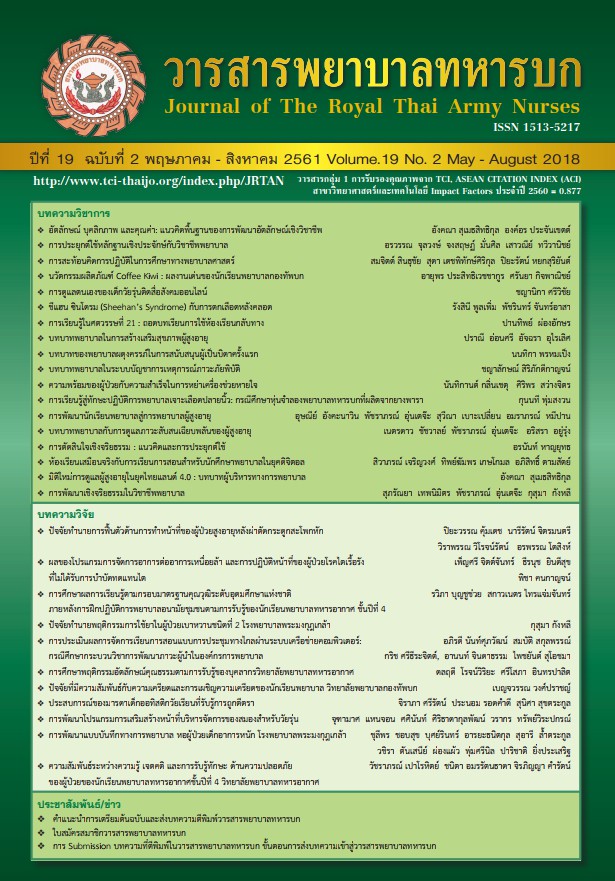The Development of Nursing Student to Engage in Gerontological Nursing
Keywords:
Nursing student, Gerontological nursingAbstract
According to aging society in Thailand, this has an impact on the increasing number of elderly patients in the health care system. The demand of professional nurses in gerontological nursing is also increasing. Nursing education is required to prepare readiness and gerontological nursing competence of nursing students, including positive attitude towards aging and elderly care to face with existing health issues of increased older adult population. Attitude towards aging, knowledge and experience are the key factors and should be concern in developing nursing student to the elderly care. Therefore, It is critical that the nursing curriculum must prepare essential knowledge in both theoretical and clinical aspects of gerontology, integrate gerontological content with learning activities to facilitated intergenerational contact between student nurses and elders, provide experience of elderly care in hospital and community, use aging simulation-based learning, and nursing educators act as role model in holistic care and caring for older adults in order to develop knowledge and positive attitude toward elderly care and consequently increase the quality of care improvement and gerontological nursing competence.
Downloads
References
2. Jitmontri N. Elderly: Trends and elder care issues. in The Art and Science of Gerontological Nursing. Tongcharean V. (Editor). 2nd ed. Bangkok. Faculty of Nursing Mahidol University. 2015. (in Thai)
3. Artsanthia J., Pomthong R. The trend of Elderly Care in 21st Century: Challenging in Nursing Care. Journal of The Royal Thai Army Nurses. 2018; 19(1): 39-46. (In Thai)
4. Suthamchai B., Keskpichayawattana J., Kaeowichian N. Synthesis of Integrated Care Service Model for Thai Elderly. Journal of Health Science. 2015; 24(6): 1017-1029. (In Thai)
5. Krirkgulthorn T., Phaonoi B., Poorananon P. Attitudes and perceived ability in using nursing process for the elderly care 2nd-4th year nursing students at Boromarajonani College of Nursing Saraburi. Journal of Nursing and Education. 2013; 6 (special issue) 116-125. (In Thai)
6. The American Association of Colleges of Nursing. Recommended Baccalaureate Competencies and Curricular Guidelines for the Nursing Care of Older Adults A Supplement to The Essentials of Baccalaureate Education for Professional Nursing Practice. New York: New York University, College of Nursing; 2010.
7. Nawsuwan K., Chotibun P. Interactions of Experience in Elderly Club Activity Participation, Experience in Caring for the Elderly, Living with the Elderly with Geriatric Competencies of Nursing Students, Boromarajonani College of Nursing, Songkhla. Princess of Naradhiwas University Journal of Humanities and Social Sciences. 2017; 4(2): 59-68. (In Thai)
8. Nawsuwan K., Singhasem P., and Naksrisang W. Essential Competencies of Registered Nurses for the Care of the Elderly in an Aging Society. Nursing Journal of the Ministry of Public Health. 2017; 27(1): 1-11. (In Thai)
9. Faronbi O.J., Adebowale O., Faronbi O. G., Musa O. O., and Ayamolowo J. S. Perception knowledge and attitude of nursing students towards the care of older patients. International Journal of Africa Nursing Sciences. 2017; 7: 37–42.
10. Boswell S. S. “Old People are Cranky”: Helping Professional Trainees’ Knowledge, Attitudes, Aging Anxiety, and Interest in Working with Older Adults. Educational Gerontology. 2012; 38(7): 465-472.
11. Koh LC. Student Attitudes and Educational Support in Caring for Older People - A Review of Literature. Nurse Education Practice. 2012; 12: 16-20.
12. Meyer G., Nel E., Downing C. Basic student nurse perceptions about clinical instructor caring. Health SA Gesondheid. 2016; 21: 444-452.
13. Lee Y. C., Hsu C. H., and Lee H. C., Effects of Aging Simulation Program on Nurses’ Attitudes and Willingness toward Elder Care. Taiwan Geriatr Gerontol. 2016; 11(2): 105-115.
14. Jeong H., Lee Y., and Kwon H. Effects of Senior Simulation Program for Nursing Students: An Integrated Study in South Korea. EURASIA Journal of Mathematics Science and Technology Education. 2017; 13(8):4437-4447.
15. Chen A.M., Kiersma M.E., Yehle K.S., and Plake K.S. Impact of the Geriatric Medication Game® on nursing students’ empathy and attitudes toward older adults. Nurse Education Today. 2015; 35: 38-43.
16. Leung A.Y., Chan S.S., Kwan C.W., Cheung M.K., Leung S.S., and Fong D.Y. Service learning in medical and nursing training: a randomized controlled trial. Advance in Health Sciences Education Theory and Practice. 2012; 17(4): 529-545.
17. Lamet R. A., Sonshine R., Walsh M. S., Molnar D., and Rafalko S. A Pilot Study of a Creative Bonding Intervention to Promote Nursing Students’ Attitudes towards Taking Care of Older People. Nursing Research and Practice. 2011; 1-6.
Downloads
Published
How to Cite
Issue
Section
License
บทความหรือข้อคิดเห็นใดใดที่ปรากฏในวารสารพยาบาลทหารบกเป็นวรรณกรรมของผู้เขียน ซึ่งบรรณาธิการหรือสมาคมพยาบาลทหารบก ไม่จำเป็นต้องเห็นด้วย
บทความที่ได้รับการตีพิมพ์เป็นลิขสิทธิ์ของวารสารพยาบาลทหารบก
The ideas and opinions expressed in the Journal of The Royal Thai Army Nurses are those of the authors and not necessarily those
of the editor or Royal Thai Army Nurses Association.






